Lawrence Hyde I (died 1590) was an MP who founded the influential Hyde family of Wiltshire. He was the great-great-grandfather, through his son Henry Hyde, of two British monarchs, Queen Mary II and Queen Anne.
Lawrence Hyde I (died 1590) was an MP who founded the influential Hyde family of Wiltshire. He was the great-great-grandfather, through his son Henry Hyde, of two British monarchs, Queen Mary II and Queen Anne.
He was the son of Robert Hyde of Norbury, Cheshire by his 2nd or 3rd wife Katherine Boydell, daughter of a certain Boydell of Pulcroft, Cheshire. [1]
During the reign of King Henry VIII, he was a clerk in the auditor’s office of the Exchequer. He was first employed in Wiltshire by the influential Sir John Thynne of Longleat. Following the Dissolution of the Monasteries, he served as a commissioner for the surveying and suppression of chantries in Wiltshire and Salisbury in 1548. At some time before 1552, he was appointed auditor to Edward Seymour, 1st Earl of Hertford, uncle of King Edward VI. He served as surveyor of crown lands in Somerset after 1575. He was a JP for Dorset and/or Wiltshire in about 1589. He was elected MP for Malmesbury in 1559, Heytesbury in 1584 and possibly for Chippenham in 1586, which tenure may be confused with that of his son Lawrence II.
His various positions enabled him to acquire much land, much due to the Dissolution of the Monasteries. In 1549, for about £1,250, he purchased lands in Bymerton, Milton, a house in Salisbury and elsewhere in Wiltshire, and small properties in Somerset, Derbyshire and Kent. His principal acquisitions included:
Hyde married twice: [1]
Hyde died on 7 June 1590 and was buried at Tisbury, where a monument survives and mentions his son Henry, the father of Lord Clarendon.

Edward Somerset, 4th Earl of Worcester, KG, Earl Marshal was an English aristocrat. He was an important advisor to King James I, serving as Lord Privy Seal.
Henry Arundell, 3rd Baron Arundell of Wardour, PC was a Peer of England during the 17th century, and the most famous of the Lords Arundell of Wardour. He served as Lord Privy Seal and Lord High Steward, and was appointed to the Privy Council. During the Popish Plot he suffered a long period of imprisonment, although he was never brought to trial.
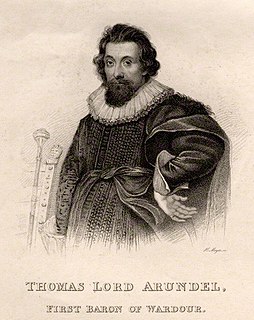
Thomas Arundell, 1st Baron Arundell of Wardour was the eldest son of Sir Matthew Arundell of Wardour Castle in Wiltshire, and Margaret Willoughby, the daughter of Sir Henry Willoughby, of Wollaton, Nottinghamshire, and wife Margaret Markham. He distinguished himself in battle against the Ottoman Turks in the service of the Emperor Rudolf II, and was created a Count of the Holy Roman Empire. His assumption of the title displeased Queen Elizabeth, who refused to recognize it, and imprisoned him in the Fleet Prison. In 1605 Arundell was created 1st Baron Arundell of Wardour. In the same year he was briefly suspected of complicity in the Gunpowder Plot.

Sir Nicholas Hyde was Lord Chief Justice of England.

Sir Thomas Arundell of Wardour Castle in Wiltshire was a Cornish administrator and alleged conspirator.
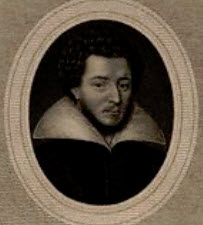
Thomas Arundell, 2nd Baron Arundell of Wardour was an English nobleman son of Thomas Arundell, 1st Baron Arundell of Wardour and Lady Mary Wriothesley.

Edward Seymour, Lord Beauchamp of Hache was an English nobleman who had a theoretically strong claim to the throne of England through his mother, Lady Katherine Grey, but his legitimacy was questioned. He was an ancestor of the Dukes of Somerset.

Dinton is a village, civil parish and former manor in Wiltshire, England, in the Nadder valley on the B3089 road about 8 miles (13 km) west of Salisbury. The parish population was 696 at the 2011 census, estimated at 733 in 2019. The civil parish includes the village of Baverstock, about 1 mile (1.6 km) east of Dinton village.
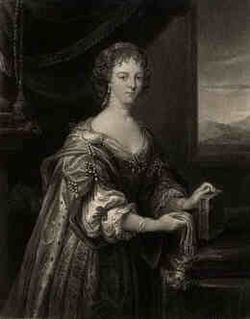
Lady Blanche Arundell was an English noblewoman, known as the defender of Wardour Castle, where she defended the castle for nearly a week with just 25 men and her maidservants against a force of 1300.
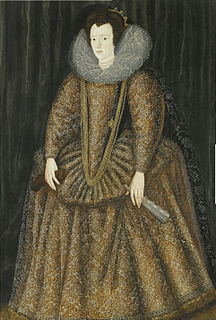
Elizabeth Hastings, later Countess of Worcester was a noblewoman born in Scotland to Francis Hastings, 2nd Earl of Huntingdon, and Catherine Pole. On 16 December 1571 at Whitehall Palace in a triple wedding with Edward de Vere, 17th Earl of Oxford and bride, Anne Cecil, and Edward Sutton, 4th Baron Dudley and bride, Mary Howard, she married Sir Edward Somerset, 4th Earl of Worcester, son of Sir William Somerset, 3rd Earl of Worcester and Christian North.

Sir Hugh Paulet of Hinton St. George in Somerset, was an English military commander and Governor of Jersey.

Henry Hyde was an English politician and lawyer. He was the father of Edward Hyde, 1st Earl of Clarendon (1609–1674), and thus was great-grandfather of two British monarchs, Queen Mary II and Queen Anne. He lived at Dinton and later at Purton, Wiltshire.

Sir Lawrence Hyde II was an English lawyer who was Attorney-general to the consort of King James I, Anne of Denmark. He sat in the House of Commons at various times between the years 1584 and 1611.
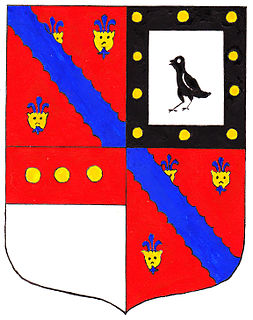
Sir William Denys (1470–1533) of Dyrham, Gloucestershire, was a courtier of King Henry VIII and High Sheriff of Gloucestershire in 1518 and 1526.

Popham is a hamlet and civil parish south of Basingstoke, Hampshire, England. According to the Post Office the population of the 2011 Census was included in the civil parish of Dummer. The area was occupied from pre-historic times and was established as a permanent habitation during the Roman occupation of Britain. The manor of Popham was established by the monastery of Winchester as an outlying agricultural grain station. A small church and school were later established, but have long since disappeared. The parish and hamlet were later dissected by the M3 Motorway and A303 trunk road. Although named for Popham, Popham Airfield and the Popham Little Chef restaurant are situated in the neighbouring parish of Steventon.
Sir Edmund Carey was an English MP from 1584 to 1614.
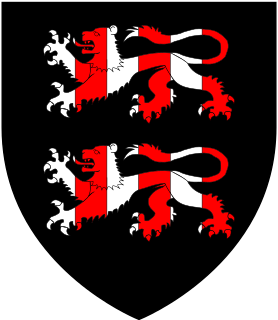
Sir Giles Strangways, of Melbury Sampford, Dorset, was five times MP for Dorset in 1553, 1554, 1555, 1558 and 1559.
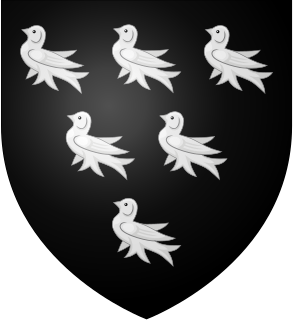
Sir Matthew Arundell of Wardour Castle in Wiltshire, known between 1552 and 1554 as Matthew Howard and after his death sometimes called Matthew Arundell-Howard, was an English gentleman, landowner, and member of parliament in the West of England.
John Zouche, of Ansty, Wiltshire, was an English politician.
Matthew Colthurst, of Wardour Castle, Wiltshire and Claverton, Somerset, was an English politician during the reigns of Henry VIII and Edward VI.